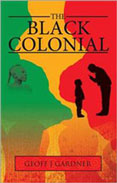"He learnt very quickly that money was in fact power and the more he had the more power he was able to gain."

 |
The Black Colonial by Geoff J. Gardner Trafford Publishing
book review by C.D.
The High Chief of the Cobuki tribe, Malanda Thica, looked to give his heir Antonio the best that life offered. Foremost, he had in mind for his son, a Western European type education that would help bring wealth and prosperity to his people, and ultimately serve to make Antonio a great leader. Herein, the ever popular phrase "it takes a village" comes to mind in considering Geoff Gardner's compelling, fictional work The Black Colonial, as we witness a triumphant African community coming together with pride, support, and sweat equity, to build a school, acquire teachers, and set Antonio on a worldly path. The young boy excels in school, is invited to attend a private institute, and ultimately gains placement at a University in England.
As a world traveler, Gardner's detailed writing suggests his own familiarity with the narrative's dual setting in Africa and England. Travel brings new experiences for Antonio including plane rides, cooler climates, cityscapes, and waiting in endless lines. Beyond traditional academics, Antonio furtively learns the art of money making in an unsavory business arrangement with a female colleague. Elementally this indulgence will play a part in shaping his final destiny.
There is an unusual dichotomy to Gardner's novel, as the story unfolds in both a positive and negative light. Initially readers may view it as an enlightening coming-of-age story, about a young African man venturing outside his homeland, to experience a modern world. In contrast Antonio also appears the prodigal son who ultimately falls prey to the trappings of money, sex, power, politics, and deceit. In a thought-provoking gesture Gardner leaves readers to ponder a final question: A brilliant man, gone bad? This seems a clever way to engage the reader to contemplate Antonio's self-serving actions and life choices, in a world that is a far cry from the village of his childhood, once invested with hopes and dreams for the future.